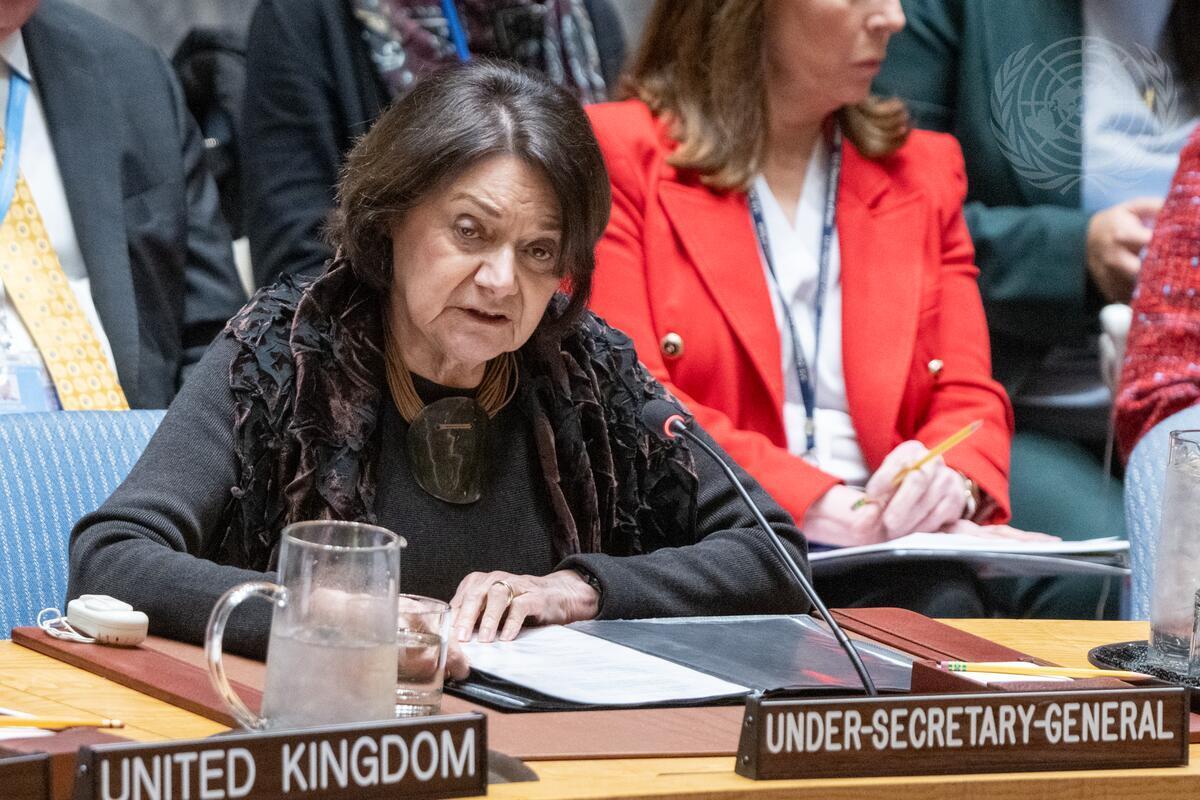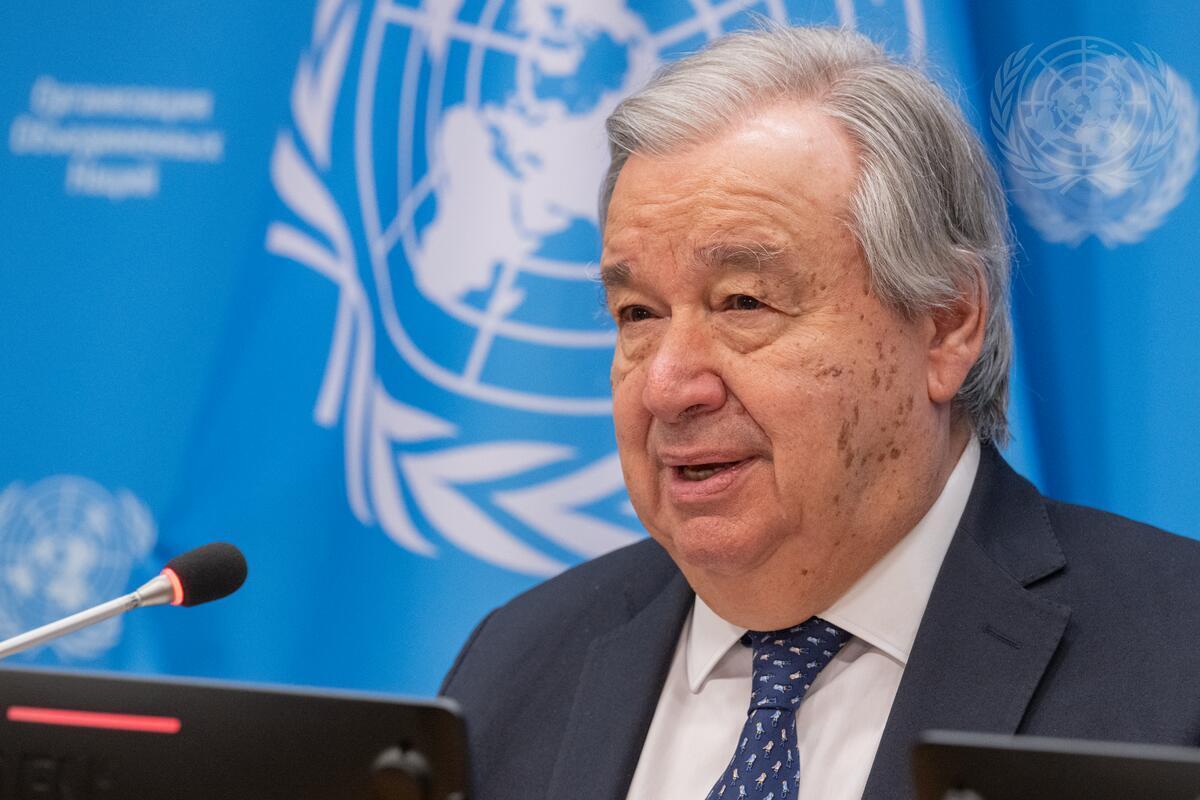Mister President,
Your Excellency Foreign Minister Lavrov, Foreign Minister Malki, Minister of State Shaheen al Marar,
Excellencies,
Members of the Security Council,
Days ago, Muslims around the world celebrated Eid al-Fitr, bringing to a close the holy month of Ramadan, which overlapped with Christian Easter and Jewish Passover.
This holy period, while mostly calm, regrettably also witnessed shocking incidents of violence at the Holy Sites and tensions across the Occupied Palestinian Territory and in Israel, with a brief escalation spilling over into the region.
While a wider-scale escalation was averted, with each de-escalation the stakes get higher and the tools at our disposal become fewer. The current trajectory is neither sustainable nor inevitable.
The parties, the region and the international community need to address the underlying political, security, economic and institutional challenges driving the conflict. There must be an end to the unilateral measures, provocations and incitement that enable violence and prevent progress toward resolving this conflict and ending the occupation.
Mister President,
Overall, in the occupied West Bank, 17 Palestinians, including two children, were killed and 200 Palestinians, including four women and 38 children, were injured by Israeli security forces during demonstrations, clashes, search-and-arrest operations, attacks and alleged attacks against Israelis, and other incidents. Another 39 Palestinians, including three women and four children, were injured by Israeli settlers or other civilians in shooting attacks, stone-throwing and other incidents.
Four Israeli civilians, including 2 women and 1 child, were killed and 31 injured, including 2 women, 1 child, and 12 Israeli security forces personnel, by Palestinians in shooting and ramming attacks, clashes, the throwing of stones and Molotov cocktails, and other incidents. In addition, a foreign national was killed, and 7 foreigners were injured.
The holiday period was largely observed peacefully, with millions of Muslim visitors to the Al Aqsa compound during Ramadan – the highest numbers in many years.
However, on 4 and 5 April, confrontations erupted at the Holy Sites in Jerusalem when Israeli security forces (ISF) entered the al-Qibli prayer hall of Al-Aqsa Mosque and forcibly removed Palestinians who were barricaded inside. ISF deployed stun grenades, beat Palestinians with batons and rifles, and fired rubber-coated metal bullets, while some Palestinians inside the mosque lit and threw fireworks and stones at ISF.
These developments came in the wake of provocative calls and incitement from several parties. Israeli extremists called for Jews to conduct ritual animal sacrifices at the Holy Sites. Hamas and other armed Palestinian factions called for Palestinians to go to Al Aqsa to resist such acts. As in previous years, Israeli police blocked attempts to carry out the animal sacrifices in the compound, arresting at least two Israelis.
Following these events at the Holy Sites, on 4 and 5 April, militants in Gaza and Lebanon fired dozens of rockets towards Israel. While some were intercepted by Israel’s aerial defense system, 46 landed in Israel, causing one injury and damage to property. The barrage from Lebanon was the most intensive since 2006.
Israel Defense Forces carried out airstrikes in Gaza and southern Lebanon on 7 April, aimed at what they said were Hamas targets. A children’s hospital and health clinic in Gaza were damaged, however, no injuries were reported.
Lebanon’s Prime Minister condemned the launching of rockets towards Israel. UN de-escalation efforts, as well as coordination and liaison by the parties with UNIFIL helped restore calm.
From 12 April, Israeli authorities prohibited non-Muslim visits to the site for the last days of Ramadan, in line with usual practice.
On 15 April, confrontations erupted between Israeli police and Orthodox Christian worshippers attempting to enter the Church of the Holy Sepulchre in Jerusalem’s Old City for the Holy Fire ceremony, exceeding an attendance limit enforced by Israeli authorities, citing safety concerns. The Greek Patriarchate and other church leaders criticized the limits on visitors, suggesting it was unjustifiably low and violated the status quo.
Mister President,
Other violence in the occupied West Bank and in Israel continued during the reporting period.
Many Palestinian casualties were incurred in Israeli military operations in Area A of the occupied West Bank and subsequent clashes, some of them armed
On 16 March, undercover Israeli forces entered Jenin, resulting in clashes. Israeli forces shot and killed four Palestinians, including a 14-year-old bystander. Hamas and Palestinian Islamic Jihad claimed two of the individuals killed as members of their armed wings.
In Jerusalem’s Old City, on 1 April, an Arab-Israeli man was shot dead by ISF near an entrance to the Holy Sites in disputed circumstances.
On 7 April, two British-Israeli sisters, the youngest a 15-year-old girl, were killed in a shooting attack in the West Bank by perpetrators in a car with Palestinian plates. Their mother was critically wounded in the attack and died three days later. No arrests have been made.
The same day, an Italian national was killed, and seven other Italian and British nationals were wounded in Tel Aviv in what the Israeli police said was a ramming attack carried out by an Arab-Israeli man, who was shot dead at the scene by police. The alleged perpetrator’s family disputed the ramming allegation.
On 10 April, a 15-year-old Palestinian boy was shot and killed by ISF during an arrest operation and ensuing clashes in Aqbat Jaber refugee camp, near Jericho. Eyewitnesses said that the boy was a bystander, while the Israeli army said that soldiers returned fire after being shot at.
Levels of settler-related violence also remained high. Huwwara remained a flashpoint. On 25 March, Palestinians carried out a shooting attack in the town, injuring two Israeli soldiers. Israeli settlers entered the town the same day and again on 27 March, throwing stones that injured two Palestinians and damaged property.
On 6 April, an Israeli settler shot and injured a Palestinian boy in Jerusalem’s Old City.
On 18 April, two Israelis were shot and wounded while in their vehicle in the East Jerusalem neighborhood of Sheikh Jarrah. The following day, ISF said they had arrested a 15-year-old Palestinian boy in Nablus who had confessed to carrying out the attack.
Mister President,
I am deeply concerned by the violence and inflammatory actions over the past weeks, particularly the violent confrontations inside al-Aqsa Mosque. I again urge respect for the status quo at the Holy Sites in Jerusalem, in line with the special role of the Hashemite Kingdom of Jordan.
I condemn the indiscriminate launching of rockets towards Israeli population centers.
I reiterate that acts of terror and targeting of civilians are abhorrent and must be condemned and rejected by all. All perpetrators of violence must be held accountable and swiftly brought to justice.
Security forces must exercise maximum restraint and use lethal force only when strictly unavoidable to protect life.
I am appalled that children continue to be the victims of violence. Children must never be the targets of violence, used or put in harm’s way.
Mister President,
On 19 March, senior Egyptian, Jordanian, Israeli, Palestinian and U.S. officials met in Sharm el-Sheikh, Egypt, to further discuss understandings reached in Aqaba, Jordan on 23 February.
In the spirit of the agreements reached in Aqaba and Sharm el Sheikh, I urge all parties to exercise the utmost restraint and refrain from any steps that could exacerbate the situation, and to take concrete steps to implement the Joint Communiques.
I remain closely engaged with all relevant parties to de-escalate tensions and chart a political way forward.
Mister President,
Turning to settlement-related developments, on 22 March, Israeli authorities announced tenders for 940 housing units in settlements in Area C and 89 units in East Jerusalem.
On 10 April, Israeli Government Ministers and Members of Knesset joined over 15,000 settlers and other Israeli civilians in a heavily secured march to the illegal outpost of Evyatar in the northern West Bank, calling on the Government to legalize it under Israeli law.
I reiterate that all settlements are illegal under international law and that they are a substantial obstacle to peace.
I call on all parties to avoid unilateral measures and provocations, such as this march, that can further inflame tensions.
Mister President,
Demolitions and seizures of Palestinian-owned property remain a deep concern. During the reporting period, Israeli authorities demolished, seized or forced owners to demolish eleven Palestinian-owned structures in Area C and eight in East Jerusalem, displacing 14 Palestinians, including seven children, a relative decline reflecting a reduction during Ramadan, as in prior years. The demolitions were carried out due to the lack of Israeli-issued building permits, which are nearly impossible for Palestinians to obtain.
On 3 April, Israel’s Supreme Court ruled against the eviction of a Palestinian family from their home in the East Jerusalem neighborhood of Silwan, ending a 30-year legal battle.
I call on Israeli authorities to end the displacement and eviction of Palestinians and to approve additional plans that would enable Palestinians to build legally and address their development needs.
Mister President,
Turning to the region, on the Golan, Israel Defense Forces reported, from 8 to 9 April, six rockets launched from Syria towards Israel and their retaliation with artillery fire and airstrikes, targeting locations in Syria, including Syrian army positions. UNDOF was in contact with the Israel Defense Forces and Syrian authorities to de-escalate the situation, urging them to exercise maximum restraint and to respect the ceasefire, in accordance with the 1974 Disengagement of Forces Agreement. No casualties were reported.
Mister President,
Amidst the deteriorating situation on the ground, the Palestinian Authority continues to face significant fiscal and institutional challenges. At the same time, the UN agencies, funds and programs that provide support to the Palestinian people, in coordination and complementarity with the PA, are facing significant funding shortfalls, notably World Food Programme and UNRWA, impacting basic service delivery.
I am particularly concerned by the prolonged closure of schools and UNRWA health clinics in the West Bank, where PA and UNRWA teachers, as well as UNRWA health staff, have been on strike for weeks, impacting children across the OPT.
Efforts are needed by the parties and the international community to strengthen Palestinian institutions, improve governance and shore up the fiscal health of the Palestinian Authority. These steps must be part of a broader political effort that addresses the underlying drivers of the conflict, provides the space and access needed for the Palestinian economy to grow and encourages the parties to update their economic and administrative relationship.
The forthcoming Ad Hoc Liaison Committee meeting in Brussels in early May provides an opportunity for a strategic shift in this direction.
Addressing these immediate challenges can also provide much needed momentum toward re-establishing a political horizon toward a two-State solution.
I urge Israelis, Palestinians, regional States and the broader international community to show leadership, re-engage and work collectively in the pursuit of peace with the aim of ending the occupation and resolving the conflict in line with international law, relevant United Nations resolutions and previous agreements, in pursuit of the vision of two States – Israel and an independent, democratic, contiguous, viable and sovereign Palestine – living side-by-side in peace and security within secure and recognized borders on the basis of the pre-1967 lines, with Jerusalem as the capital of both States.
Thank you.






